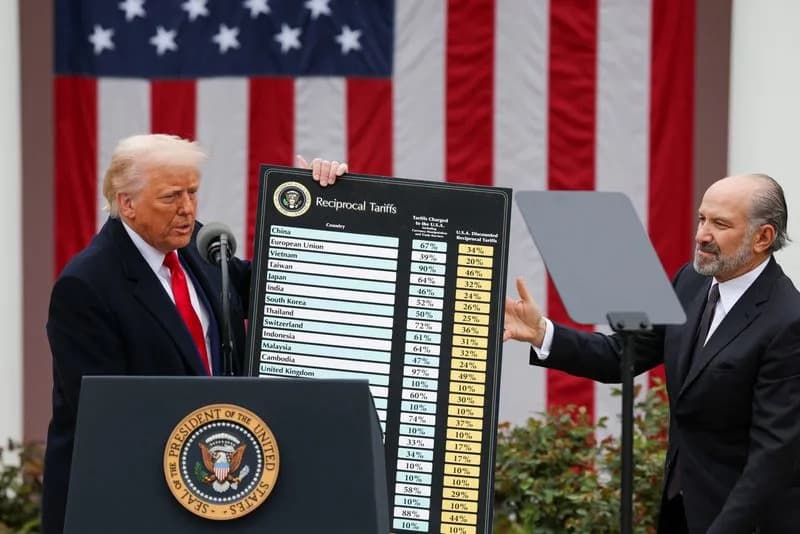Summary: The Trump administration's national-emergency justification for a 39% tariff on Swiss imports has been reversed: tariffs will drop to 15%, aligning with EU rates. The move undercut the administration's claim that foreign tariff disparities explained a large U.S. goods deficit, since Switzerland's average tariff on U.S. goods is only about 0.2%. Critics note the rollback followed a Swiss visit during which President Trump reportedly received expensive gifts, raising questions about whether the original emergency declaration was genuinely economic or politically motivated. Months of trade data will be needed to judge whether the new agreements deliver the claimed benefits.
Tariff 'Emergency' on Swiss Imports Rolled Back — But Was There Ever an Emergency?

The sudden tariff, the sudden reversal
Earlier this year, President Donald Trump invoked a national emergency to impose a staggering 39% tariff on all imports from Switzerland. The administration said the move was justified by "large and persistent annual U.S. goods trade deficits" that it claimed posed an "unusual and extraordinary" threat to national security and the U.S. economy. The order also referenced President Trump's push for "reciprocal" tariffs, blaming the trade gap in part on foreign partners' higher tariff rates.
Facts that undercut the rationale
At the time, critics pointed out obvious inconsistencies. Switzerland's average tariff on U.S. goods is roughly 0.2%, so the idea that disparate Swiss tariffs were driving a U.S. deficit did not fit the facts. Last year the United States ran a $38.3 billion goods deficit with Switzerland, and through July the bilateral deficit had reached about $55 billion — figures that undermine the simplistic claim that higher home tariffs automatically eliminate trade shortfalls.
What looked like an emergency?
The administration's framing — that everyday Swiss products like chocolate, medicines and luxury watches could constitute a national security emergency — struck many observers as implausible. Imposing a sweeping increase in tariffs on such consumer and industrial goods raised legal and policy questions about the proper use of emergency powers.
The rollback and official response
Over the weekend the White House announced a rollback: tariffs on Swiss imports will be cut from 39% to 15%, the same rate the administration applies to European Union goods, as part of new agreements with Switzerland and Liechtenstein. U.S. Trade Representative Jamieson Greer said in a statement that "President Trump's unmatched dealmaking continues to deliver for the American people" and described the framework as removing barriers that had held U.S. exporters back.
Does the rollback resolve the 'emergency'?
That depends on how one reads the evidence. If the administration's goal was to reduce a trade deficit, the continued large deficit with Switzerland through July suggests the problem did not disappear overnight. The White House has argued that the new deals — with Switzerland among several partners — will produce more "reciprocal trade" and other benefits, but reliable confirmation will require several more months of trade data.
Two interpretations: either a narrowly defined economic emergency ended within months (despite large bilateral deficits), or there never was a genuine emergency and political considerations influenced the decision.
Timing and optics
The tariff rollback occurred days after a Swiss delegation visited the White House. Reports say President Trump received a gold Rolex and an engraved gold bar estimated at about $130,000 — gifts that federal rules would normally bar a president from keeping unless accepted on behalf of an institution such as a presidential library. The White House said Mr. Trump accepted the items for his library. Critics also note earlier episodes — for example, an exemption granted to Apple days after its CEO visited the White House and left a gold memento — that raise questions about whether gift-giving and diplomacy influence trade decisions.
What it means
At minimum, the episode highlights weaknesses in the administration's public justification for emergency tariffs and underscores the need for clearer, more consistent trade policy. Whether the tariff rollback represents a pragmatic correction, an outcome of diplomatic exchange, or evidence of transactional decision-making will become clearer only after independent trade data and further scrutiny.
Bottom line: The dramatic tariff increase on Swiss imports has been reduced, but unanswered questions remain about why the emergency was declared in the first place and whether policy decisions were shaped by political optics rather than economic logic.
Help us improve.




























